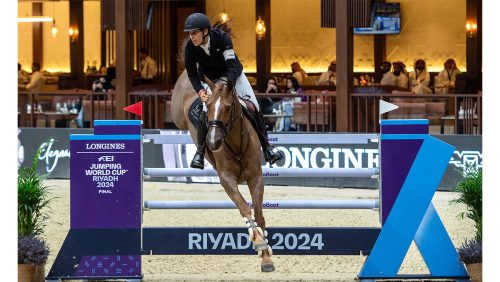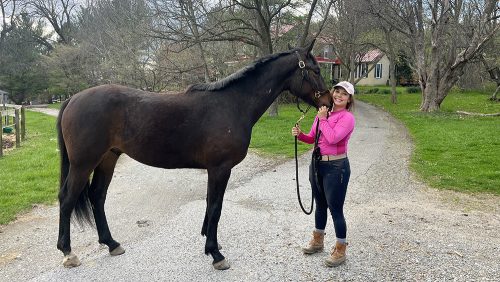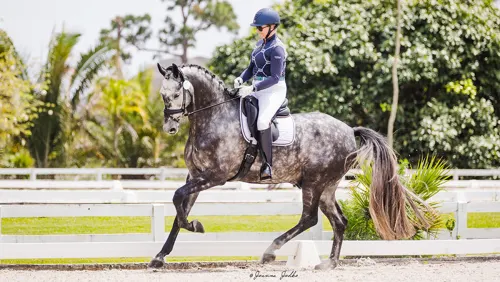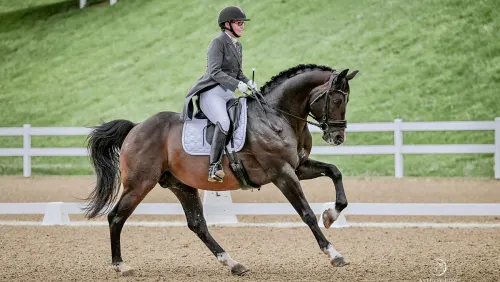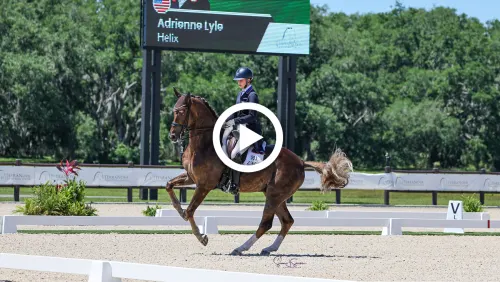Fortunately for Kay Meredith, her mentor, Col. Bengt Ljungquist, placed a great deal of emphasis on the quality of a horse’s walk. So while in Sweden, looking for a horse for Meredith, he happened to notice a big, lanky, rather ugly horse, who had a powerful walk.
But when the 5-year-old Swedish Warm-blood arrived at Linda Zang’s Idlewilde Farm in Davidsonville, Md., in 1977, he wasn’t quite what Meredith had been expecting.
“In the beginning, I can’t tell you what a disappointment he was in the stall,” Meredith recalled. “He was raw-boned and had a big head, big ears, big feet–everything was big.”
But it didn’t take long for Meredith to come around to Domino, a black horse with four white socks and a blaze. “In a day’s time we were bonded,” she said of the horse formerly owned by a young girl in Sweden. “He was a love.”
Meredith started from ground zero with Domino, who’d had no formal training. She later learned that he’d placed second in a bucking contest in Sweden, and that ability would often haunt her as she brought him up the levels. But she soon came to appreciate what Ljungquist had seen in the young horse.
“He saw the presence that, later on, everybody saw,” said Meredith. “He had a lot of flair and great movement.”
At times, Domino’s love of bucking proved to be quite a challenge, especially when Meredith started working on lengthening the canter. “At the end of Linda’s indoor arena was a four-foot wall, with bleachers on the other side, and many times I hoped I wouldn’t get launched over it,” she said with a laugh. “But eventu-ally all of that got over with, and you teach a big horse like that to contain himself. Through weeks and months, that all came to rights.”
Meredith also taught Domino all sorts of tricks, like unzipping zippers, drinking out of the hose with her, and taking bread out of her mouth. “He was mouthy–always nibbling and looking for a treat because the Colonel always had sugar,” she said.
All Around The World
Domino started competing when he was 6, and Meredith drove from her home in West Virginia to Zang’s each month to train with Ljungquist, the U.S. Equestrian Team’s dressage coach until he resigned shortly before his sudden death in 1979.
“It was a hard journey; those mountains were formidable,” she said. “But the truck could have done that drive blindfolded.”
ADVERTISEMENT
Meredith recalled that Domino performed well right from the beginning. “Within six months, we were beginning to get round, and I could feel the cadence and tremendous length of his shoulders,” she said. “There are a lot of horses who are that talented, but not so many that have that spark that draws people to watch them. I was so supremely fortunate to get one of those in my life.”
He quickly won at training level and was the 1978 USDF Horse of the Year at second level. “I just wanted to see how far we could go,” Meredith said. “I was young, and the thought of Grand Prix was out there somewhere. I was naﶥ enough to think that would come about.”
Domino soon developed a fan club among local children who came to watch the shows. “Even standing still, he took your attention because he was so big,” she said. “You couldn’t help but notice him. He’d filled out, and every kid in the world wants a black horse with four white socks and a blaze.”
Ljungquist saw the horse advance to the FEI level, but he never got to see him compete at Grand Prix. “I wish he could have seen that, but he knew the potential was there,” said Meredith.
In the early 1980s, after Ljungquist’s death, Meredith shipped Domino to Europe to train with Wilfried Schmidt and compete against the best in the sport. In that setting, they grew even closer.
“I had only a tiny smattering of German, and it was not a time when a lot of other Ameri-cans were going to Europe [to train],” said Meredith. “Often I was the only American at competitions. In that case, the only companion you really have is your horse–we were so close.”
Since Meredith completely took care of the horse herself, she knew him as well physically as she did emotionally. They placed in the top 10 of every class they entered in Europe, including finishing ninth of 21 at the prestigious Aachen CDI (Germany), sixth at Rotterdam (Netherlands) and seventh at Donaueschingen (Germany).
“I didn’t realize at the time that that was a big deal,” she said. “I just remember thinking, ‘What a hoot this is!’ “
Meredith, who served as the U.S. Dressage Federation president from 1977 to 1982, returned to Europe again in the late ’80s, this time with a group of Americans. “Those stints in Europe were meaningful because it was still hard to believe that this hillbilly from West Virginia was over there and able to compete successfully,” she said.
Although Meredith didn’t compete on any international teams with Domino, the opportunities he gave her to compete in Europe advanced her career and helped her to bring her next horses even further. “[He gave me] the opportunity to have worked with Ljungquist and Schmidt and [Georg] Theodorescu–people at that level, to go and see what it’s really like,” she said. “To see the movements and horses and people you’ve read about helps you to get the most movement out of your horse. It was an opportunity to be exposed to that sort of atmosphere and teaching and watching people who have been in the business forever.”
Meredith had religiously kept diaries of what she was learning in Europe, and she applied it to her teaching when she returned. But in hindsight, the opportunity she most treasured was sitting on Domino’s back every day.
ADVERTISEMENT
“I’m most proud of being the lucky one who got to have him,” she said. “That I got to take a raw-boned 5-year-old who could really buck and that we went into international circles, and I went in and made him proud of himself.”
Making Music
One reason Meredith was originally drawn to dressage was for the opportunity to ride to music, and her patriotic freestyles with Domino were among the favorites ones she has ever ridden. “It was so much fun,” she said of riding to a George M. Cohen medley, which included “Yankee Doodle Dandy.”
“I figured I was a Yankee for sure–when you go to Europe, you really feel your American-ness. All of the pieces [of the freestyle] make you feel American, and they were fun to ride to,” she recalled.
But as Domino crept into his teens, the years of hard work started to show their toll. “That’s the thing about that tremendous motion that can come back to haunt you,” Meredith said. “His joints were all long. He would take his fetlock to the ground, and he would superflex everything.”
When a discomfort in his right hind became persistent, Meredith took her partner back to Idlewilde, where he lived out his retirement in a field with Zang’s stars Fellow Traveler and Atticus. “He spent a few years in retirement in knee-deep grass,” said Meredith. “At the time, I didn’t have the pastures, and I’m thankful to Linda that she let him spend his last few years there, happy and fat.”
At age 16, Meredith had to make the decision to have him put down, as the pain had become too bad in his right hind leg. “He couldn’t get around, and I didn’t want him to fall down,” she said.
Today, Domino is never far from Meredith’s mind, as his photos abound in her home in Raleigh, N.C. If she’s feeling particularly nostalgic, she may pull out the scrapbooks and ribbons they won in Europe, which she keeps in a cupboard.
“Having him be such a part of my life when I was away from my family [in Europe]–and I had two small sons then–was very special,” she said. “He was such a close companion. He was also a very close connection for me with Col. Ljungquist.
“Of all the people in the world who could have gotten him, I was the one who did. I got him when he was 5, and we went all over the world together. He was truly a life-expanding experience for me.”






